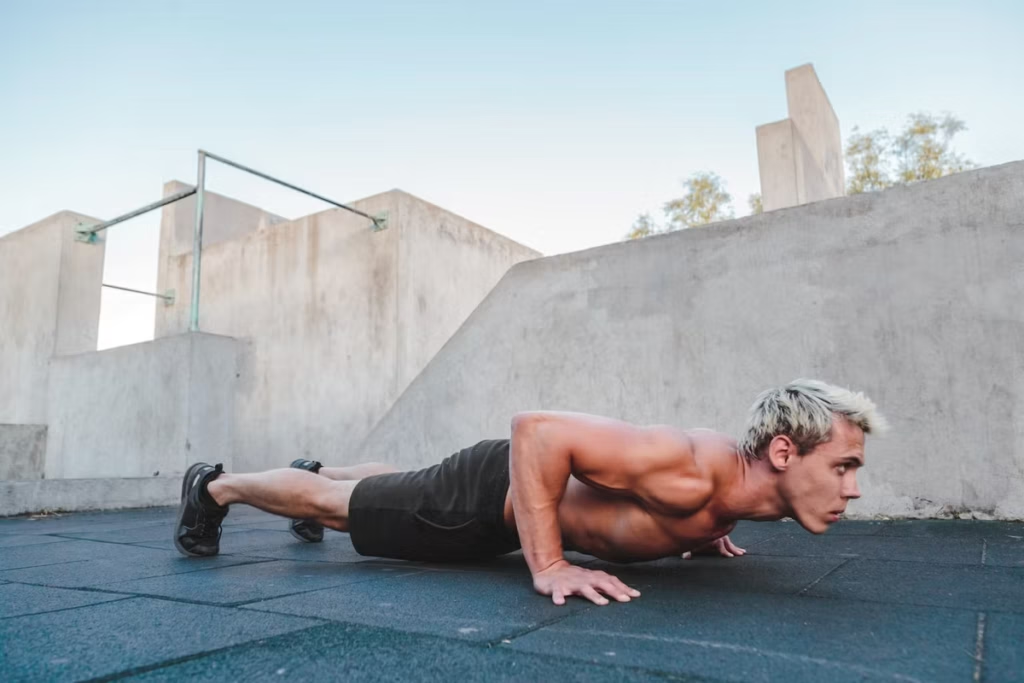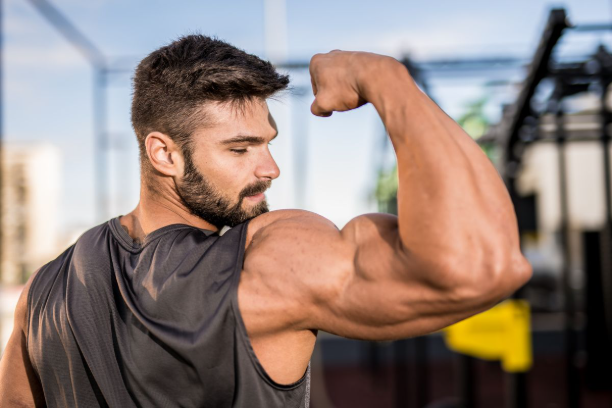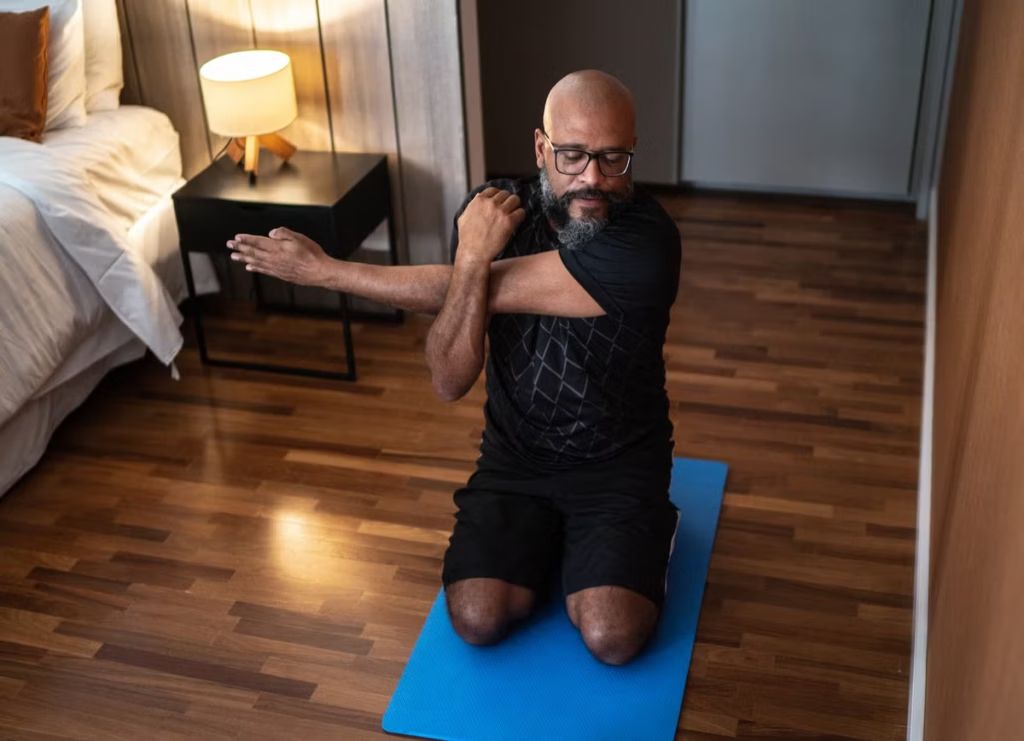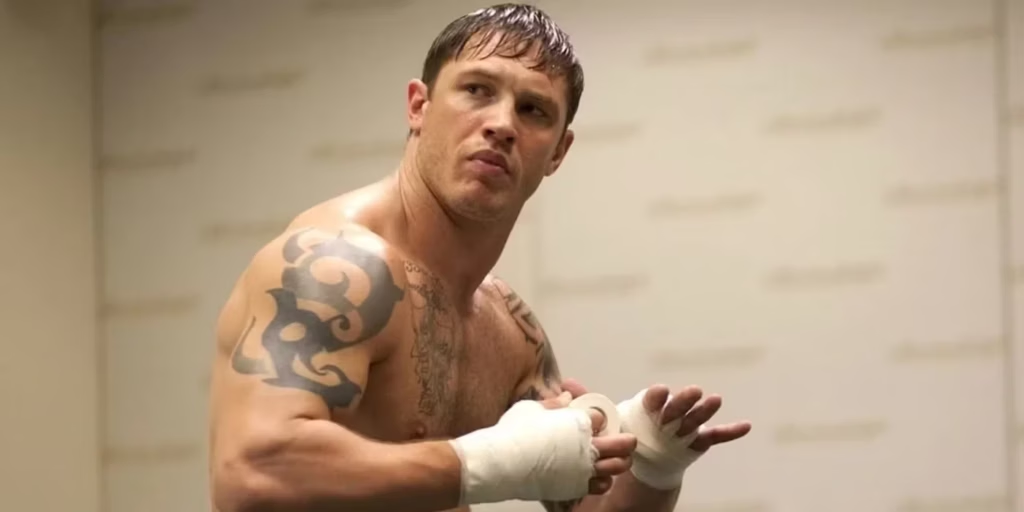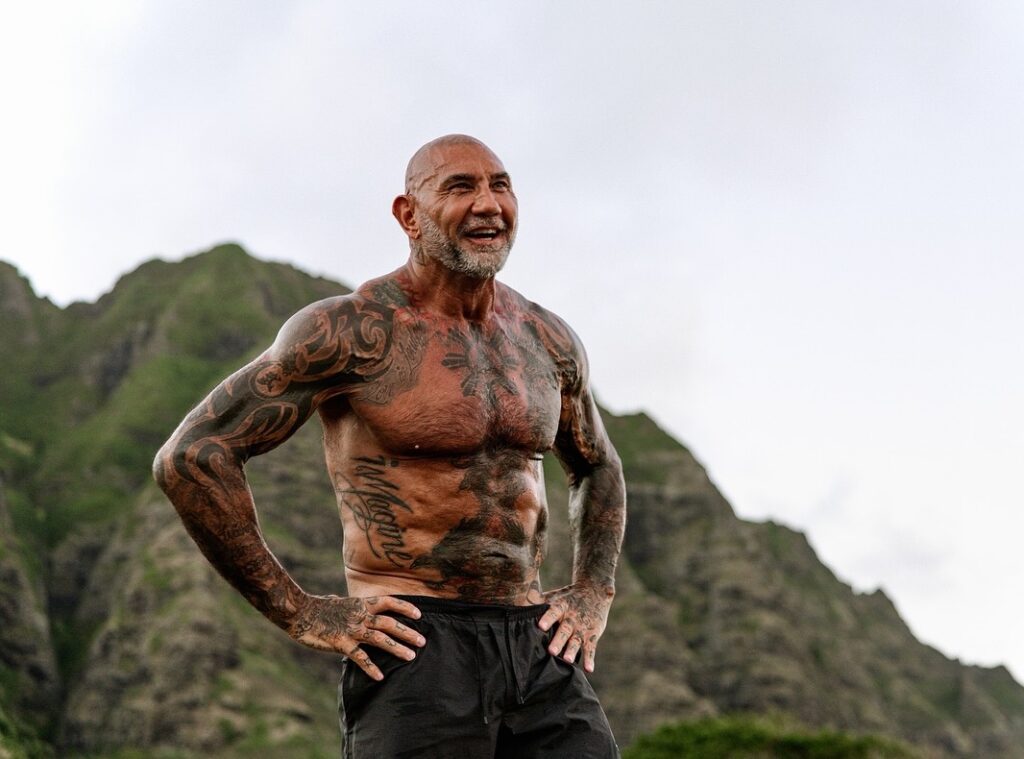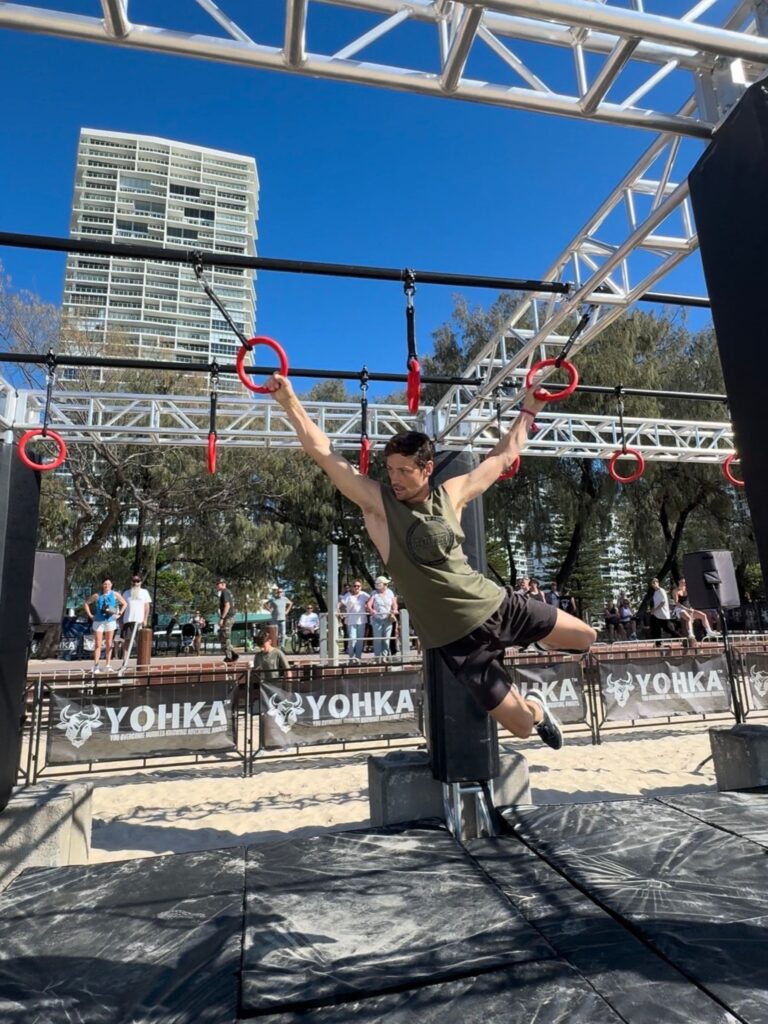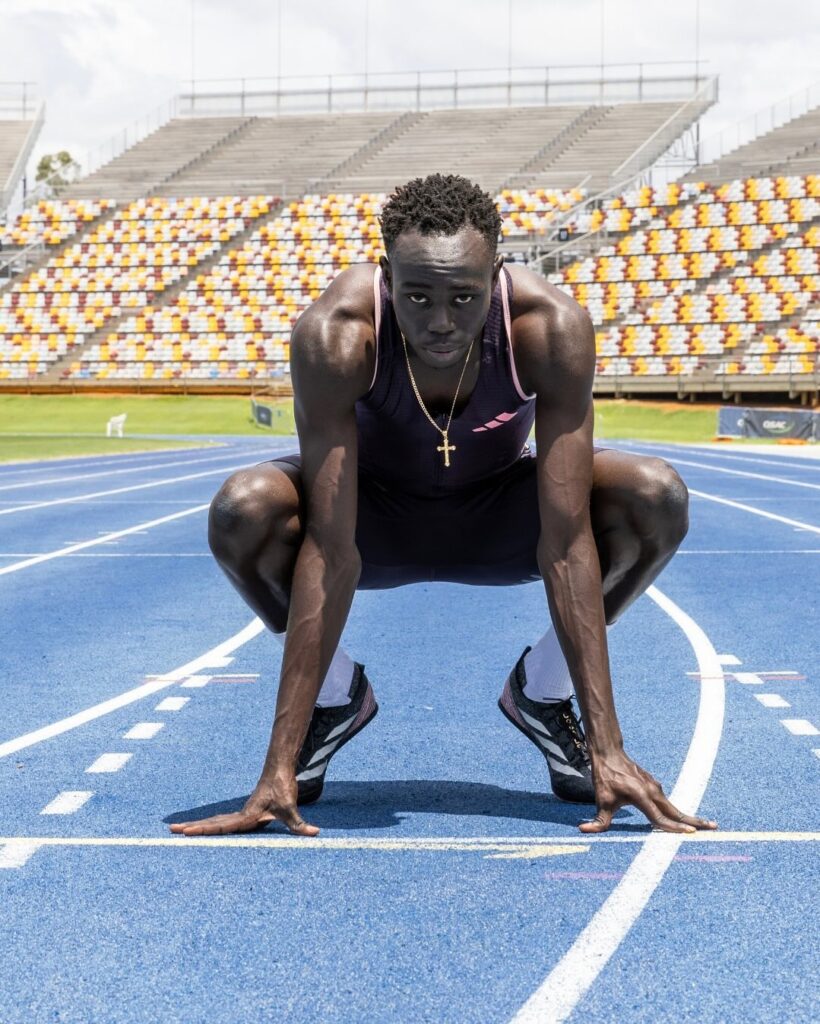YOU WOULDN’T KNOW it to look at him today but there was a time when Lachlan Rowston’s body was a source of shame. He didn’t like to take off his shirt and when he did he was taunted by his mates. For an insecure 16-year-old, a rake-thin physique presented a problem that required a solution. Rowston found one in working out.
“It was probably the first time that I had an opportunity to fix a massive problem in my life,” says Rowston, who’s chatting to me today inside his glass box of an office overlooking the gym floor at Lockeroom on Bligh St in the heart of Sydney’s CBD. “I was like, I want to gain weight and be stronger and look like these guys [Men’s Health cover models]. So being able to pour time and energy into it felt really good.”
After a successful career as a CrossFit athlete and gym owner, Rowston and his business partner, Raph Freedman, are now seeking to solve problems for a very exclusive clientele comprising corporate executives, CEOs and entrepreneurs, some of whom I can see working up a sweat through windows of Rowston’s office.
The gym, together with the original facility on Bridge Street, is an immaculate study in black and chrome, with the kind of state of the art equipment and luxe finishes you’d expect to find in a Manhattan-style health club—a daily laundry and towel service, Aesop bathroom products and canned water by Calm & Stormy, are some of the upscale amenities on offer. The clientele are distinguished by their wealth, power, status and age. To make it in the door they’ve been vetted, passed a two-stage referral process and perhaps most importantly, haven’t blinked at fees that can reach up to $365 per week.
Ultimately, though, they too are people with problems—high stress, poor diet, no time, lack of sleep, muscle imbalances, too much sitting, excessive drinking—the usual culprits. At Lockeroom, Rowston aims to ensure they find a solution.

Lockeroom Bligh Street.
INSIDE MANY A gym rat there’s often a former teenager who struggled with body confidence. In Rowston’s case the realisation that he wasn’t as big as his friends caused him anxiety and he began assiduously lifting weights in his backyard with equipment supplied by his dad, a sports nut who imported American sporting goods for a living. He also used his high-school gym at lunch times. “I was probably a similar height [190cm] to what I am now, but 65 kilos, whereas I’m about ninety-five kilos now,” says the 30-year-old, who grew up in Neutral Bay. “I was pretty much the only person in my entire grade that did weights with the purpose of trying to gain weight, coming to school with Tupperware containers and chicken that I’d cooked up.”
He began to bulk up and the progress he made spurred him to seek out a career in training. After school he began working as a PT at a gym in Mosman before discovering CrossFit, which he liked “because it was like a sport”. “It wasn’t like headphones on, sweating in the gym by yourself,” he says. “There was camaraderie, you’re doing workouts together.”
CrossFit would become Rowston’s life over the next five or six years, as he competed individually and then as part of a team with his friend and now business partner, Freedman. In 2014, the pair opened a CrossFit gym in Marrickville (which later became part of business called Creature Fitness), though, as Rowston admits now, at the time competition rather than growing the enterpise was the primary focus.
“We opened a gym, but we didn’t start a business until probably three years after,” he says. The pair lived and breathed WODs and metcons and ate accordingly. “There was a cafe chain’s warehouse down the road and when the food was about to go off, the manager would call us and be like, ‘Hey guys, there’s sweet potato if you want to come get it’ because we were just training like athletes. We would cook it in the microwave, no preparation, no cleaning, just a block of butter. That was how we survived.”
The pair slept upstairs above the gym in a space with “no aircon and about a thousand mosquitoes”, playing rock, paper, scissors to see who’d get the physio table and who got the floor. Fun times and the hard work saw them become one of Australia’s leading CrossFit teams, ultimately missing out on qualifying for the CrossFit Games in Los Angeles in 2017 by one spot.

The bathrooms at Lockeroom.
After that Rowston was done with competing and instead turned his attention to making the gyms–he and Freedman had expanded to locations in Edgecliff and Bondi Junction–viable as a business. Looking back he believes they missed the peak of CrossFit. “The day we opened our CrossFit gym [in February, 2014] was the exact day that for the first time since CrossFit started on Google, the trend line started going down,” he says. “That was the apex. And so we caught the other side of that.”
Rowston quickly grasped that the market had changed and with the rise of F45 and the entry of a number of US fitness franchises like Barry’s Bootcamp and Orange Theory into the Australian market, competition in the group training space was suddenly fierce. “There was all these new chains and I was like, I don’t think we can compete anymore. People are coming in with a better product at a lower price.”
The pair began selling off pieces of the three-gym Creature Fitness business and in 2019 conceived of Lockeroom. “We just felt like, What’s an untapped market? What are all the problems we have with running gyms at the moment? How can we fix it with a new model?”
At the same time, there was interest among their existing clientele for something more bespoke and premium. “Some of our clients were similar to Lockeroom clients,” says Rowston. “They might work in a hedge fund or be a managing director or own their own business. They would always ask us, ‘Hey, can you help me with my nutrition? Can we do some personal training sessions?’ Basically, ‘can I spend 250 to $300 a week with you?’ At some point we started thinking, what if we built a gym that was just for these clients?” They also entertained the idea of targeting celebrities, “until we realised that Australia doesn’t really have many celebrities and they don’t want to pay.”
They decided to focus solely on corporate clients and began investing in the Lockeroom brand. Launching during Covid would throw up all sorts of challenges but the concept was solid and once the CBD began to open up again and workers returned to the city, the brand took off, first on Bridge St and more recently in their new Bligh St location, with plans for up to four CBD sites. So, what’s so special about the concept and its members?

Rowston and Freedman.
A BIG PART of building an exclusive brand is creating demand through careful positioning. Lockeroom launched with a 100-member cap and a vetting process befitting of an underground gentleman’s club. It has relaxed the cap slightly—Rowston says the current client list is around 150 per gym. “It worked really well [the 100-member cap] and we filled up really fast and then we got to a hundred and we realised if we stayed there, we’d be losing money every day,” says Rowston. “The more high-end clientele, executives, business owners that are in the gym, the better it is for everyone. As long as they still get the same service delivery, they still get the results.”
Rowston admits the gym’s pricing, which starts at $240 and can reach $365 per week depending on the desired package, does a lot of the vetting for them. “It’s going to cut a lot of the people initially,” he says. An affluent client list is generally an older one and Lockeroom targets these customers with services such blood work screening, vitamin and supplement recommendations, physiotherapy, pain management and rehabilitation.
A two-member approval process in which existing clients from the same company must vouch for a prospective member also helps ensure a good cultural fit. But while the client list is exclusive, Rowston insists it’s also diverse. “What you imagine a really successful CEO to be is nothing like what you see on TV,” he says. “It’s everyone: men, women, older, younger. They’re not necessarily a certain type of person, but if they have one characteristic in common, it would definitely be that they know what hard work is. They’re under no illusions. And when they don’t get a result, then it’s like, ‘My fault’. They take responsibility.”

Lockeroom Bridge Street.
They also understand their limits, he says, something that’s not always the case with younger gym-goers. “They’re very honest about who they are and what’s going to work for them,” says Rowston. “Whereas I think when people are a little bit younger, they might have some false beliefs around how good they’ll be on their own. Our clients are like, ‘Look, I’m happy to invest money because I’m shit by myself and I’ve got no accountability to myself and I eat like crap’. That self-awareness piece is really good.”
Clients are naturally data driven and results focused, something Rowston initially tapped into by giving them a WHOOP band as part of their membership. The gym is now revamping its ‘Concierge Medicine’ offering for even deeper and more comprehensive insights, but Rowston is adamant that data can only take you so far.
“They [clients] often want it to be some magic pill or injection,” he says. “But ultimately, they’re never going to feel as good or lose as much weight or be as pain-free as they are just doing the basics. And it’s very easy to get off course with the basics over 30 years. There are a lot of bad habits in place: too much alcohol, not enough sleep, no outlets for their stress, not enough steps. Those things over a long enough time can result in pretty poor health.”

Rowston behind the mic on The Mind Muscle Project.
A SUCCESSFUL CAREER in CrossFit and a thriving boutique fitness business would be more than enough for most people, but in the background of all of this Rowston and Freedman have been running one of Australia’s most successful health and fitness podcasts, The Mind Muscle Project, launched way back in 2014.
“I think Joe Rogan was on episode 200 or something,” says Rowston. “He’s on episode 2000 or something now. I remember pitching our first advertisers and having to explain what a podcast was. That’s how early it was.”
The podcast now averages around 150,000 downloads a month, with two shows a week attracting a global audience—only around 30 per cent of the audience is Australian. Rowston credits the podcast’s success to getting in early and consistency. “We’ve always put up at least one episode a week.” And since Covid, the pair only interview guests in person, necessitating a lot of travel, including one US trip in which they interviewed 14 people in 10 days. “After doing three or four years of Zoom podcasts, you just get over it,” says Rowston. “It’s just not the same. But being able to have a conversation with someone that we really respect or idolise in person, we’re able to get a much better product.”
As hosts who are both business partners and friends, Rowston and Freedman have inbuilt chemistry. Their background as CrossFit athletes and gym owners also gives them credibility in a crowded market, much like ex-athletes who offer analysis on TV sports broadcasts. “The fact that we own a separate business together validates it a little bit more than other people whose only job is to create content,” says Rowston.
It’s perhaps worth noting that Rowston’s favourite book is Yuval Noah Harari’s bestseller, Sapiens. “I like books that explain human nature,” he says. “The best book for me is something that blends evolutionary psychology and patterns in society and human nature with business. Just learning about how humans behave and the patterns that we have, it helps you learn more about yourself and honestly, it makes you a bit more forgiving of yourself. It also helps you predict the future a little bit. And in business, the better you can predict the future, the better decisions you can make.”
What Rowston hopes to achieve with Lockeroom is that the particular cohort of humans who join the gym for its targeted, elevated fitness experience, never leave. “I view it from the client’s perspective, which is when you find a doctor or a dentist or an accountant you like, you don’t really want to change,” he says. “And that is the same with how people think about their bodies. If you find a really good personal trainer that gets you great results, you are healthier because of them being in your life and you don’t want to change.”
The impediment, says Rowston, is often due to trainers moving on to other gyms, or because the client and trainer become friends and the accountability is no longer there, or as is common among executives, travel interferes with their training progress, something that feeds into Rowston’s ultimate ambitions for Lockeroom. “If I could solve that problem by putting more Lockerooms all over the world, then no matter where the clients are, no matter what business they’re doing at the time or what city they’re in, they can literally pick up exactly what they’re doing here and just continue it over there.”
It’s a grand ambition. And for Rowston, another problem to solve.
The Lockeroom Workout
Use this workout to build a body that can fill out a suit.
Plyometric warm up:
- A1: single leg vertical jump and land 3 x 3/side
- A2: seated vertical 3 x 3
- A3: Low to high banded rotation chop: 3 x 10/side
Strength:
- B1: Neutral grip Bench Press (multi grip bar) 5 x 6-8 @22X1
- B2: Wide Grip Pull Up: 5 x 8-10 (weighted)
Accessories:
- C1: Cable lateral raise 3 x 15/side
- C2: Cable reverse Fly 3 x 20
- C3: Side plank 3 x 60sec/side

Rowston in action on the gym floor. (Supplied)
LOCKEROOM
Address: Shop 2/38-42 Bridge St / 4-6 Bligh Street, Sydney, NSW.
Hours: 24/7
Related:
The Hemsworth vs Momoa biceps beef is threatening to boil over
Khan Porter on staying positive when you’re injured








